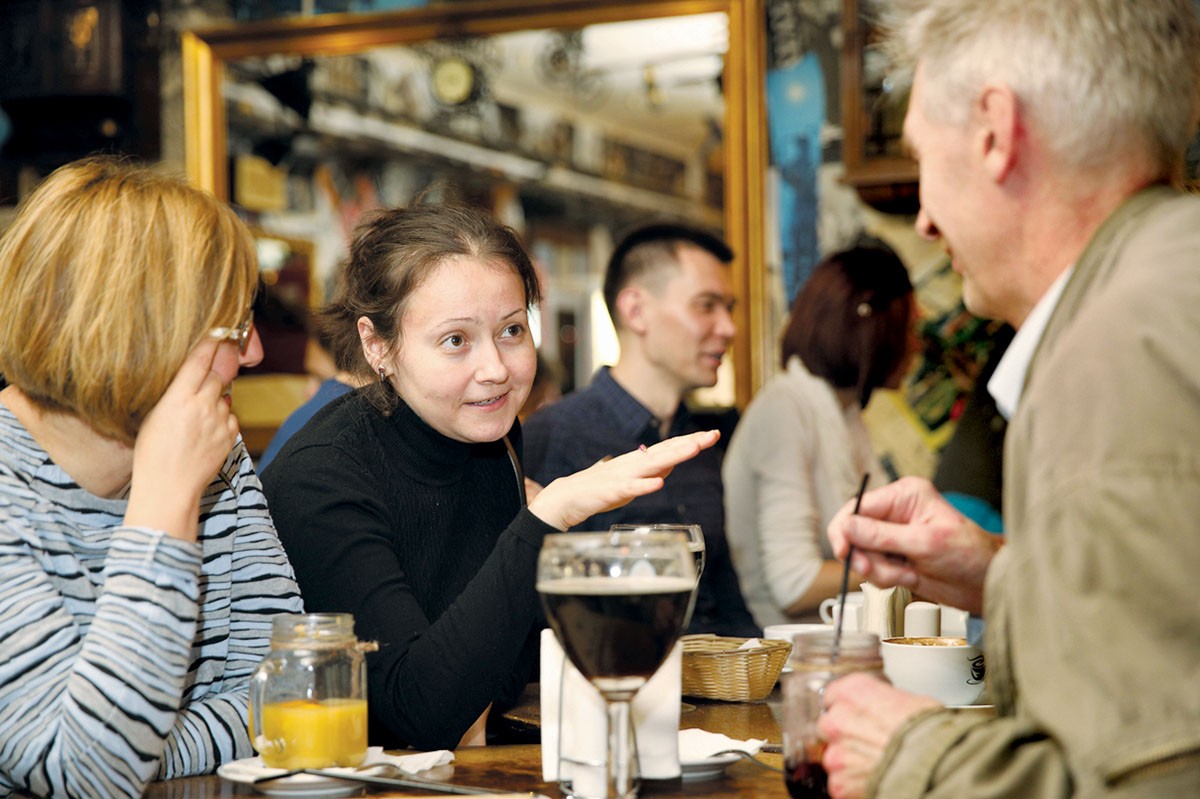Members of a German speaking club in Kyiv call their meetings “Stammtisch,” which is translated from German as regulars’ table, as they meet every Wednesday in the same restaurant.
The club was launched at least 20 years ago (or even earlier, nobody knows) as friendly meetings of native German speakers. Today it is an open community for anyone who speaks German, including Ukrainians and foreigners from different countries.
They gather every week at the Dom Bergonie art cafe near Teatralna metro station to discuss news and share knowledge.
Daniel M. Porcedda, one of the members who reorganized the club a year ago, says that he enjoys the meetings. “It connects people that can learn something from each other and that makes life beautiful,” he told the Kyiv Post.
History, reorganization
The club has been meeting since at least 1997. Around 10 years ago, when Porcedda started attending, they gathered at Muka restaurant on Khreshchatyk Street. He says that it was the first regular German-speaking meetings in Ukraine. “It was a spot, where German people met to talk, have some food, drink and sometimes play cards,” he said.
Porcedda, 58, moved to Ukraine in 1998 for business reasons. Since then he has lived in Kyiv and worked in many different fields. Today he provides foreign companies that do business in Ukraine with management and corporate services.
Coming from Luxembourg, Porcedda speaks German, French and Luxembourgian as native languages.
In the fall of 2016, the usual venue, Muka restaurant, closed down, so they had to find a new place. That was when Porcedda took the initiative to find a suitable venue and change the club’s concept to invite Ukrainians also.
“We live in this country,” Porcedda said. “I don’t understand why some foreigners remain in their closed communities.”
One thing that remained the same: time and day of meetings — Wednesdays at 7 p. m.
Stammtisch today
There are more than 200 people in the club’s group on Facebook and, on average, 15 people attend each meeting.
Porcedda says that people of different occupations meet at Dom Bergonie — artists, lawyers, journalists, entrepreneurs and students. Some of them live here, others stop by while visiting Ukraine, he says.
There are no set topics or any rules, except for one: knowledge of German.
“They don’t have to know the language perfectly, nobody does, but they need to be able to follow conversations and take part in them,” Porcedda said.
Apart from that, the club’s curator makes sure that every member feels comfortable.

People who attend Stammtisch meetings don’t have to be fluent in German, but have to be able to follow conversations. (Volodymyr Petrov)
“What I take care of is that people are polite, they don’t start political debates or promote any ideology in a way that it hurts somebody. Because this would break apart the group.”
Stammtisch members sometimes stay late into the night, closing the restaurant down.
“Sometimes we have such funny discussions that we have tears in our eyes from laughing and sometimes very serious conversations but in a very friendly relaxed manner,” he said.
German for beginners
While Stammtisch is a perfect get-together for those who are fluent in German, there is another speaking club in Kyiv suitable for beginners and those who don’t feel confident yet talking to native speakers.
They as well meet every Wednesday at 7 p. m. at Puzata Hata restaurant near Lva Tolstoho Square metro station.
This club was founded in May 2009 by the Language Exchange Club community that coordinates many speaking clubs around Kyiv.
Roman Rybakov, 26, found out about the club eight years ago back in his student years when he started to learn the language. He has attended meetings on a regular basis since then.
He believes that such speaking clubs help to break the language barrier. He says that often people know grammar and write well, yet are afraid to speak, especially with native speakers.
“Talking to those whose language is imperfect helps. They will give you time, listen to you, while you can think how to formulate something and then say it,” he told the Kyiv Post.
Today Rybakov gives private German lessons and knows the language well. He attends stammtisch, but still visits the club at Puzata Hata to meet old friends.
Rybakov says that they usually talk, discuss how everyone is doing and play games like “associations” or “words.”
The club connects students, beginners and those, like Rybakov, for whom the club has become a tradition.
Stammtisch. Dom Bergonie (17 Pushkinska St.) Wednesday, 7 p. m. Free
www.facebook.com/groups/1725996007727870
German speaking club. Puzata Hata (40 Velyka Vasylkivska St.). Wednesday, 7 p. m. Free
www.facebook.com/groups/82542151162
